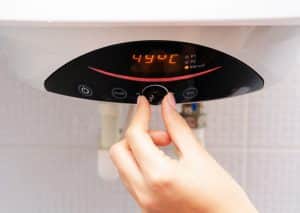
Picture it, it’s a Monday morning, and you’ve just pulled yourselves out of your warm bed to begin your week.
You turn on the shower, walk away to let it heat up only to come back, jump in, and get the shock of the day—freezing cold water.
The water heater is not working, and you don’t know what to do.
First, do not panic.
While it’s not an ideal way to start the day, it is quite common for a water heater to stop working.
The ideal thing to do is to call a local Calgary plumber so you can continue with your day.
It can also be helpful to know what to look for in order to give the plumbers a detailed explanation of the problem—or better yet, maybe fix it yourselves.
When calling a plumber to discuss your hot water tank issues, it is best to know the age of your tank, size of the tank and type of the vent.
5 Common Hot Water Heater Problems
A hot water heater not working can be the result of any number of things.
Knowing how to address the issue, or at the very least how to describe the problem to a licensed plumber is essential.
In a best-case scenario, a water heater not working can simply be the result of the pilot light going out.
If that is the case, simply relighting it could solve the issue.
If that doesn’t work, then we’ll need to do a little more digging.
1. Water Temperature Issues
One of the most common complaints of water heaters not working is the fact that we experience water temperature issues.
This can be either water not heating up enough or the water being way too hot.
In most cases, simply go to the water tank and adjust the thermostat on the tank. It may have been bumped by accident and caused the temperature to change.
Turning down the water tank’s temperature is also a common practice to save energy during the summer months. Increase the thermostat temperature during the winter months will fix your temperature issue.
If the water does not heat up when you turn up the temperature, you might be experiencing a faulty thermostat. The solution is to replace the thermostat.
Other common issues we’ve found when it comes to water temperature fluctuations include:
- A leak in the water tank
- The gas control or burner assembly might be damaged.
- Mineral deposits reducing the heater’s efficiency
- A problem with the temperature-pressure relief valve.
In most cases, such as the temperature-pressure relief valve, the pieces can be replaced.
However, if the tank has a leak in it, it is time to call in a professional to replace the unit.
Without proper tools and knowledge, attempting to fix these issues yourself could lead to personal injuries, further damage to the devices and even damage to your home.
More importantly, it can even result in natural gas leaking into the house, posing an extreme danger to you and your family.
2. Discoloured/Smelly Water
Another common problem that we face with water heaters is smelly or discoloured water.
To diagnose properly, you need to ask the following questions:
- Has this been happening for a while?
- Do all the faucets in the house produce this water?
- Have you used the water lately?
- Does the problem go away after you’ve run the water for a while?
- Does it happen to both hot and cold faucet?
By answering these questions, you will be able to address the root of the problem easier.
Discoloration
If the issue is water discoloration, then the problem is most likely being caused by high mineral levels such as iron and copper, causing the pipes to rust.
Water in Calgary is considered ‘hard’ as it contains high concentrations of magnesium and calcium – coming from the Rockies.
A common solution to this is to install a water softener system in your house.
While this is not dangerous to your overall health, it can lead to problems with the plumbing system that can affect the performance of appliances.
Scale builds up in the system: deposits of ‘lime’ that can block the flow of water in pipes (as well as in shower heads and taps) and play havoc with the water heater, washing machine, and dishwasher.
These issues are easily solved by installing a whole house water filter or even a water softener.
Strong Water Odors
There are various reasons as to what may be causing the strong water odours coming from the faucet.
If you believe it’s the hot water tank, you can test this by running the hot water for a few minutes.
If the water smells like rotten eggs or sewage-like scents, this can be a sign of bacteria growing inside the water tank.
When this happens, your first course of action would be to flush the water tank thoroughly.
If that doesn’t solve it, the anode rod might have been corroded and needs to be replaced.
Another typical smell is garlic, which simply means the pilot light needs to relight.
Finally, if the odour is exceptionally strong, it could be an issue with the gas line.
When this happens, you need to turn off the unit, ventilate the area before vacating, and call both a plumber and the gas utility company.
3. Water Heater Making Noises
A noisy water heater doesn’t usually alarm many individuals; however, it can be annoying.
There could be several things that cause a water heater to be noisy.
As with the discolouring of the water, excessive buildup of minerals and sediment could be causing the noise that we hear.
To avoid this from happening in the first place, you should flush your water heater out often, typically once a year.
The buildup can happen due to the sediment being burned by the heating element or your heating element itself needs to be replaced.
As it begins to deteriorate, it can slowly burn out and cause noises from within the unit.
If it’s a boiling sound that you are hearing, this is the sound of the unit overheating, causing dangerous pressure buildup.
In this case, call a professional immediately.
4. Leaking Water Heater
If you’ve noticed a drop in the water temperature, there might be a leak in your water heater.
In order to repair the leak, it is important to determine the origin and the cause of the leak.
Some of the main causes include:
- Age
- Bad plumbing installation
- Poor maintenance
- Loose drain valve
- The pressure to the tank
A leak can be very apparent as water pools near the unit and can also be dripping from the unit or pipes leading to it.
In the case of loose valves, these are easily replaced on your own or tightened if it’s loose.
If it’s a corroded water tank, then you’ll need to have it replaced.
5. Damaged Gas Control or Burner Assembly
Another common diagnostic for an unfunctional water heater is a damaged gas control or burner.
A water heater cannot work properly if the burner is dirty or non-functional, hence causing the water to not heat up.
The solution is to replace the damaged gas control or burner assembly – also known as a thermocouple.
If you try relighting the pilot light and none of the other issues above seem to apply to the situation, then it may be as simple as replacing the thermocouple.
To replace the thermocouple yourself, you first need to turn off the gas and the water to ensure that you won’t cause any further damage.
If you have any doubt, call a professional to do the job right.
Need a New Hot Water Tank? Call Pete the Plumber
Sometimes there is no easy fix and a hot water tank issues are simply the result of needing a new unit entirely.
Installing a new water tank is no easy feat, so having a professional available to do the install is imperative.
We offer 24/7 emergency service and a 2-year warranty on parts and labour.
Give Pete the Plumber a call at 403-257-1766 or head online to request an appointment today!

